Yevno Azef. The great provocateur's own game
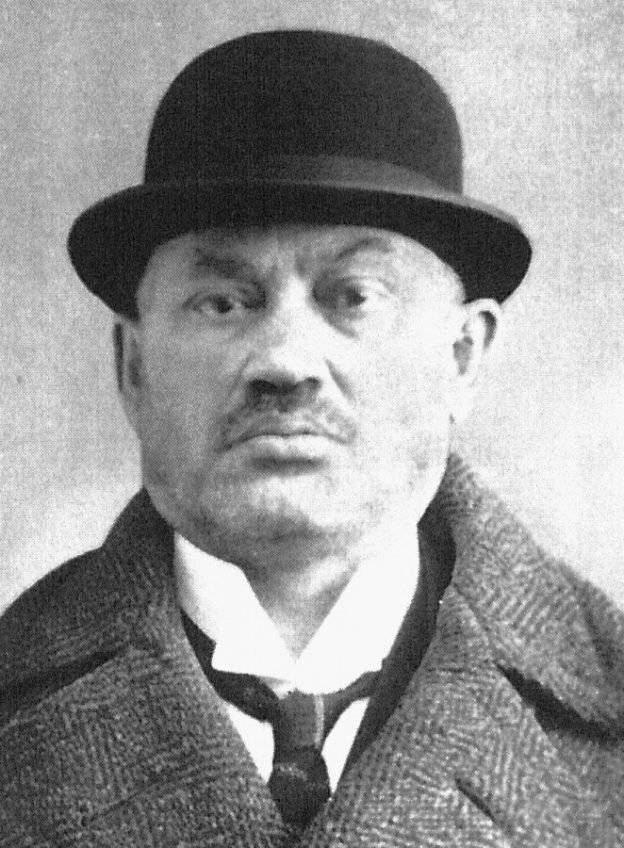
В previous article it was told about the youth of Yevno Azef, the beginning of his cooperation with the Security Department and his fantastic career in the Socialist Revolutionary Party. Today we will continue and finish this story.
Head of the SR Combat Organization
On May 13, 1903 (according to the Gregorian calendar), the first head of the Combat Organization Grigory Gershuni was arrested in Kyiv - and it should be said that Azef had nothing to do with his arrest. In 1906, Gershuni escaped from the Akatui convict prison (he was taken out in a barrel of cabbage) and reached the United States through Japan.
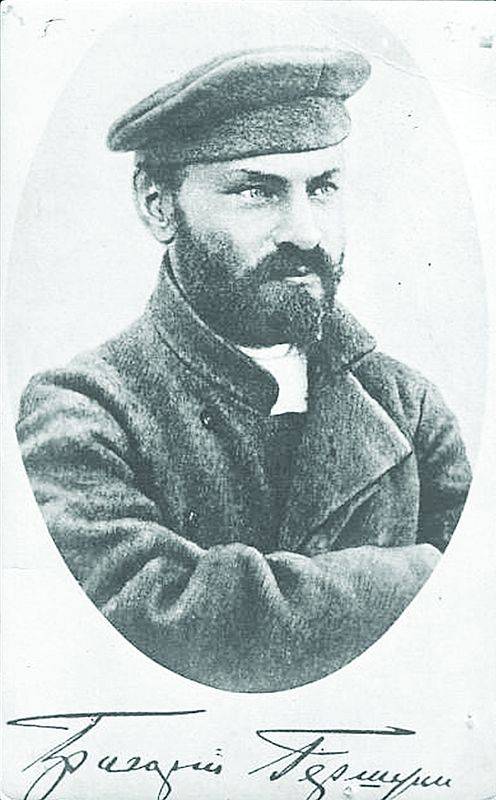
Grigory Gershuni
Here he collected a huge amount for his party - 180 thousand dollars. The American currency at that time was still backed by gold, and at the turn of the 0,04837th and 180th centuries, the gold content of one dollar was 1906 ounces. Thus, 8 thousand US dollars in 706 is 3 ounces of gold, which at the exchange rate as of October 2023, 16 is 38 million 427 thousand 9 dollars 1 cents or 579 billion 468 million 280 thousand 1906 rubles. By the way, Gorky in 10 collected only 891 thousand dollars in the USA ($023,77 at the current exchange rate) - 18 times less.
In March 1908, Gershuni died in Geneva from lung sarcoma. But back in 1903, it was Azef who took his place as head of the Socialist Revolutionary Combat Organization. It must be said that Azef proved himself to be a brilliant organizer and a good psychologist. The employees he personally selected (who had no idea that the chief served in the Okhrana) turned out to be extremely resistant during interrogations; none of them cooperated with the investigation or betrayed their comrades. It was Azef who singled out and made B. Savinkov his deputy, who would later replace him as head of the Combat Organization.

B. Savinkov
Savinkov wrote about his boss:
I knew Azef to be a man of great will, a strong practical mind and great organizational talent. I saw his unwavering consistency in revolutionary action, his devotion to the revolution, his calm courage.”
About the people accepted by Azef into the Combat Organization, Savinkov says:
But young Alexander Kerensky, who wanted to join the Combat Group, did not pass the interview with Azef.
Let us add that Azef’s younger brother, Vladimir, was also a member of the Social Revolutionary Fighting Organization. He did not know about his relative’s work for the Okhrana; after his exposure, he emigrated to the United States.
According to Boris Savinkov, Azef personally planned and supervised at least 25 murders and attempts. Let's list the loudest of them.
In July 1904, the carriage of V. Plehve, who replaced Sipyagin as Minister of Internal Affairs, was blown up. If you believe S. Yu. Witte, it was Plehve who was the author of the notorious expression “small victorious war”:
The perpetrator of this terrorist attack was student E. Sozonov. B. Savinkov recalled:
And the well-known Ekaterina Breshko-Breshkovskaya, who entered history with the nickname “grandmother of the Russian revolution”, who previously politically incorrectly called Azef a “Jewish face”, after the murder of Plehve “bowed to him in Russian to the ground.”
By the way, to spy on Plehve, some members of the Combat Group began working as cab drivers and cigarette sellers - and the police then helped “resolve issues” with real representatives of these professions, who had run into unexpected and unwanted competitors.
Azef also received a reward for this case, since he reported that he managed to prevent the attempt on the life of Sergei Zubatov, the former head of the Special Department of the Police Department, who was dismissed by Plehve, which was simultaneously planned by the Socialist Revolutionaries. The revolutionaries allegedly wanted to take revenge on him for creating strikebreaking trade unions.
In February 1905, the famous terrorist act was carried out on the territory of the Kremlin against the Governor General of Moscow - Grand Duke Sergei Alexandrovich, uncle of Nicholas II, who was the main culprit of the tragedy on the Khodynskoye Field. As the Muscovites who did not like him joked, the Grand Duke then “gave his brains for the first time in his life.” The perpetrator of this terrorist act, as we remember, was I. Kalyaev, mentioned in the first article.
On June 8 (July 11), 1905, P. Kulikovsky killed the Moscow mayor P. Shuvalov.
In December of the same 1905, Tambov vice-governor N. Bogdanovich, an active participant in the suppression of peasant unrest in this province, was shot dead, and earlier, on his orders, demonstrators in Zlatoust were shot. The performer was mechanic M. Katin.
On January 1, 1906, Chernigov governor A. A. Khvostov was wounded. Performers: A. Shpaizman and M. Shkolnik.
In August of the same year, Zinaida Konoplyannikova killed General G. Min, the commander of the Semenovsky Life Guards Regiment, at the New Peterhof station, who participated in the execution of peaceful demonstrators on January 9, 1905 (Bloody Sunday) and in the suppression of the Moscow December Uprising of 1905.
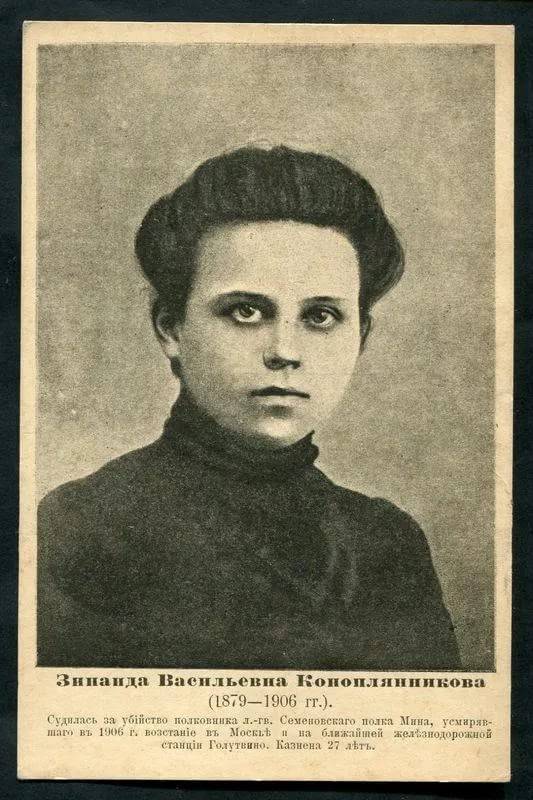
Zinaida Vasilievna Konoplyannikova, a rural teacher, was handed over to the police by Azef and became the first woman hanged in Russia in the XNUMXth century.
The commander of the 3rd battalion of this regiment, N. Riman, miraculously escaped the assassination attempt that A. Yakovlev tried to commit, and was so frightened that he fled from Russia. He returned in the summer of 1907 - secretly, after growing a beard. And his would-be killer, Alexander Yakovlev, was sentenced to hard labor, but fled to France, after the outbreak of the First World War, he volunteered for the French army, and on April 10, 1916 he died near Verdun.
In April 1906, B. Vnorovsky made an attempt on the life of Moscow Governor-General F.V. Dubasov: Dubasov was wounded, his adjutant Count S. Konovnitsyn was killed.
In July 1906, in Peterhof, Y. Finkelstein mistakenly shot and killed Major General S. Kozlov, whom he mistook for the St. Petersburg Governor General Trepov. It is curious that S. Kozlov was married to the great-granddaughter of A.V. Suvorov.
At the beginning of December 1906, S. Ilyinsky shot and killed Count A. Ignatiev, a member of the State Council, in Tver.
At the end of December of the same 1906, the St. Petersburg mayor Vladimir von der Launitz was killed, who became famous for giving the Black Hundreds 2 thousand rubles as a reward for the murder of the deputy of the First State Duma M. Ya. Herzenstein. The perpetrator is the son of a village priest and former seminarian E. Kudryavtsev, who previously tried to kill Stolypin.
On the other hand, Azef prevented a real-life assassination attempt on another Minister of Internal Affairs, P. Durnovo, in a very unique way: he declared that only he himself should be a suicide bomber. The Social Revolutionaries did not dare to sacrifice the leader of their Combat Organization. Azef did not do this for free: he demanded an additional 5 thousand rubles from the Police Department. The frightened Durnovo, who even stopped visiting his mistresses for fear of being killed, did not hesitate to allocate these funds.
Azef also “helped prevent” his fictitious assassination attempt on Nicholas II.
But Azef had nothing to do with the high-profile assassination attempt on Stolypin on August 12 (25), 1906 (the explosion of the prime minister’s official dacha on Aptekarsky Island in St. Petersburg). This action was organized by the “Union of Socialist-Revolutionary Maximalists”, the main role in its organization was played by Mikhail Sokolov, who during the Moscow December Uprising of 1905 was the head of the Presnya Combat Committee.
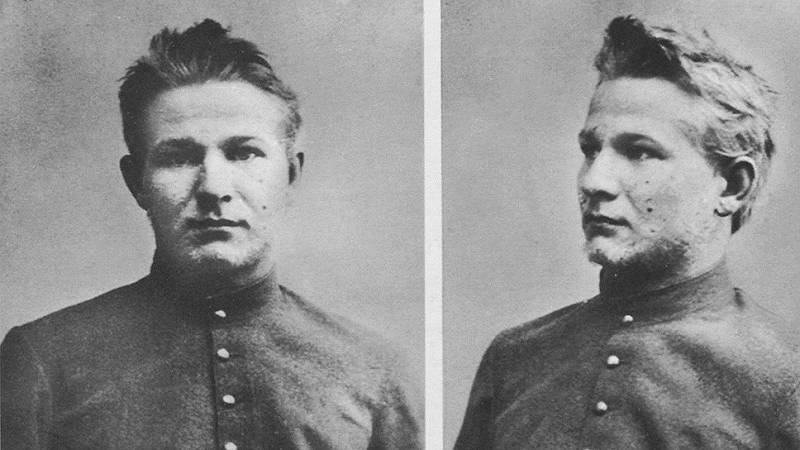
Mikhail Sokolov
The Bolsheviks were allies of the maximalists. The bombs for this terrorist attack were manufactured in the laboratory of the Combat Technical Group under the Central Committee of the RSDLP, which was headed by Leonid Krasin (he would become the first People's Commissar of Foreign Trade of the USSR and People's Commissar of Railways of the RSFSR), and then this laboratory was located in the Moscow apartment of Alexei Peshkov. The person in charge of security was Simon Ter-Petrosyan (Kamo). This was discussed in the article Narodnaya Volya heiress Natalya Klimova.
After the manifesto of October 17, 1905, some leaders of the Socialist Revolutionary Party were inclined to suspend the terror. Boris Savinkov spoke out against it. As for Azef, he proposed “before the cessation of hostilities” to carry out an attack on the Security Department:
From the second half of 1906, Azef suddenly went over to the side of the Okhrana again: now he reported the date and time of the planned assassination attempt, and the indicated persons simply postponed the trip or changed the route. The effectiveness of the Combat Organization of the Social Revolutionaries sharply decreased, which gave rise to new rumors about an Okhrana agent embedded in the leadership.
Japanese money for Russian revolutionaries
During the revolution of 1905, with the participation of Yevno Azef, Connie Zilliacus (Finnish active resistance party), Georgiy Dekanozov (Georgian Federalist Socialist Party), as well as the well-known Gapon (later executed by the Socialist Revolutionaries at the suggestion of Azef and Savinkov), the transportation of a large party to Russia was organized weapons. The financing was provided by the Japanese military attaché in Stockholm, Akashi Motojiro (before the start of the war, he was a military attaché in St. Petersburg).
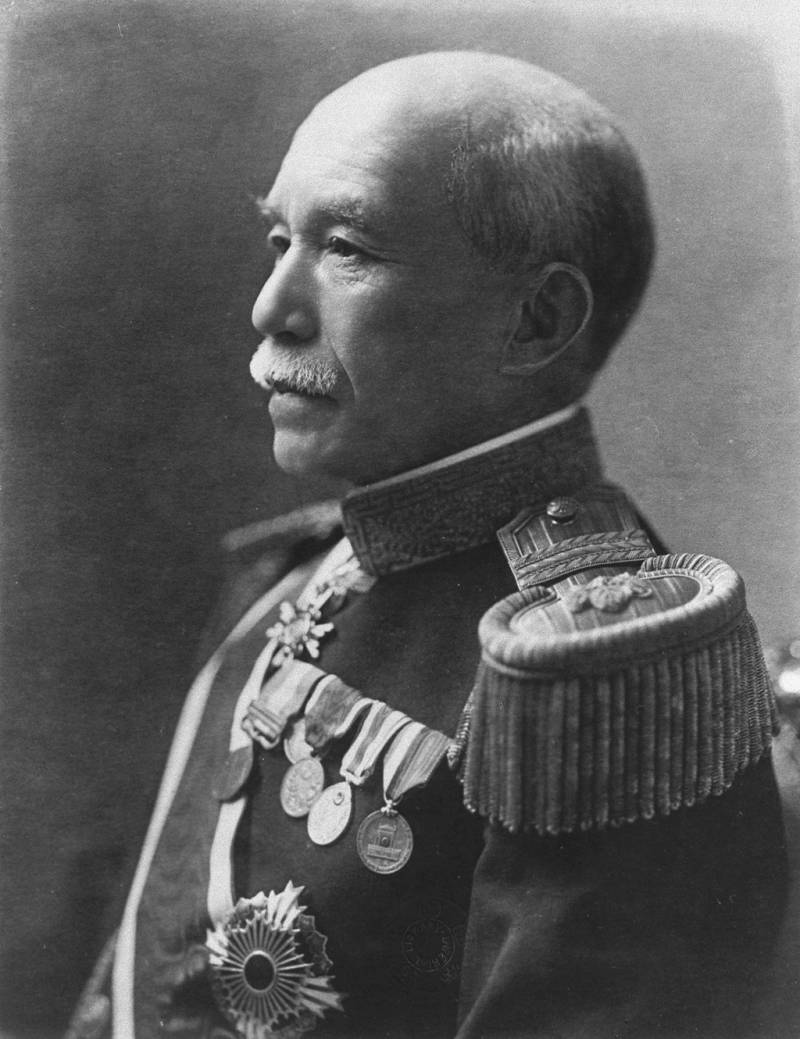
Colonel Akashi Motojiro, future head of the Japanese police in Korea, deputy chief of the general staff, governor of Taiwan
To deliver weapons to Russia in London, a certain Mr. Watt, a partner of the Japanese company Takada & Company, bought the John Grafton steamer with a displacement of about 300 tons.
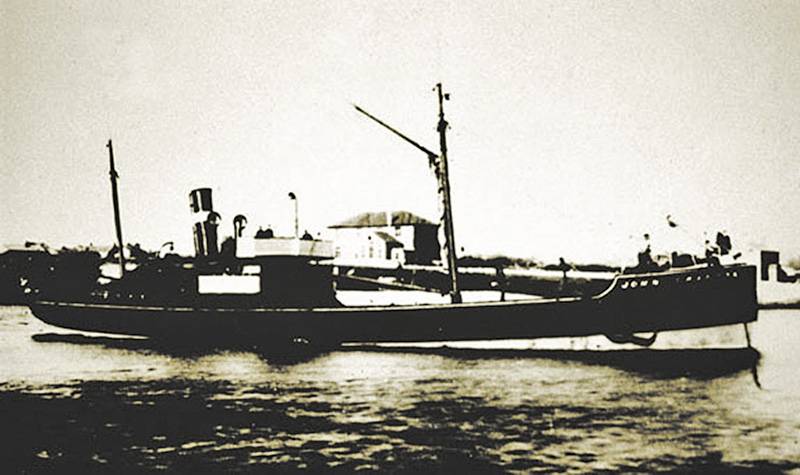
The steamer John Grafton in a photograph from 1900
Watt resold the ship to the wine merchant Dickenson, who acted as treasurer of the Social Revolutionaries. The ship was renamed, receiving the name "Luna". In the Dutch city of Vlissingham, the crew of the steamship was replaced by Latvian socialists. In the English Channel, 16 thousand rifles, 3 thousand revolvers, 3 million cartridges and 3 tons of explosives were loaded on board another ship, the Fulham steamer, renamed Unkai Maru (and also purchased with Japanese money).
The Luna ran aground in the Gulf of Bothnia near Larsmo (a monolingual Swedish municipality in present-day Finland) and was sunk, but some of the weapons were transported to the surrounding islands, and then to the mainland. Based on these events in the USSR, a two-part feature film “Wait for John Grafton” was shot at the Riga Film Studio in 1979.
Akashi carried out a similar operation on the Black Sea: the steamship Sirius (displacement 600 tons) delivered 8,5 thousand rifles and 1,5 million cartridges from Amsterdam. The weapons near Poti were loaded onto four longboats, one of which was detained by border guards. However, the Georgians deceived the Japanese colonel: they took the weapons, but never started an uprising.
Akashi later recalled:
In total, Akashi Motojiro spent a million yen (about 35 million dollars) on subversive activities against Russia - the so-called “discreditable budget” issued to him by the General Staff; he began spending it even before the start of the war. General Yamagata Aritomo reported to Emperor Meiji that one Colonel Akashi in Europe was worth “more than 10 divisions of troops in Manchuria.” However, recently in Japan itself they have been more skeptical about Akashi’s activities, believing that he did not spend the funds allocated to him very effectively.
Exposing Azef
Back in 1905, an unknown woman came to E. Rostkovsky, a member of the St. Petersburg committee of the Socialist Revolutionary Party, whose face was covered with a veil. She gave him a letter that said, in part:
The first person Rostkovsky showed this letter to was Azef, who turned the conversation into a joke:
The letter was declared a provocation. Azef remained above suspicion for now. But “a certain T.” the Socialist Revolutionaries figured out: it turned out to be a member of the Central Committee, Yuri Tatarov, who, according to the verdict of the party, was “executed” in Warsaw - shot by F. Nazarov.
As for Azef, his deputy Boris Savinkov said:
This continued until journalist Vladimir Burtsev, who had previously been convicted of participation in one of the People's Will organizations, took up the investigation, spent a year in the Peter and Paul Fortress, fled from Siberian exile to Switzerland, returned to Russia in the fall of 1905, but left again abroad in 1907. He became widely known as a “hunter of provocateurs” and even received the nickname “Sherlock Holmes of the Russian Revolution.”
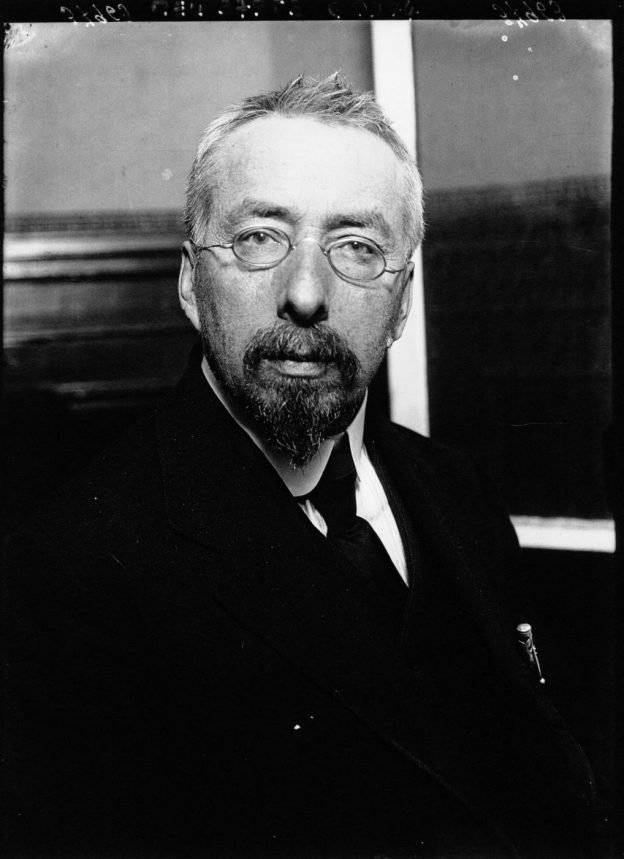
V. L. Burtsev
In 1906 (according to some sources - in 1905) Burtsev received information from one of his informants that an agent known to him only under the code name “Engineer Raskin” had been infiltrated into the SR Combat Organization. Some believe that the one mentioned in the previous article Leonid Petrovich Menshchikov, senior assistant clerk of the Police Department.
An investigation conducted by Burtsev showed that the most likely candidate for the role of this agent is electrical engineer E. Azef, the head of the Socialist Revolutionary Combat Organization. Of course, no one believed Burtsev, and then he himself staged a blatant provocation. It is very likely that it was Burtsev who organized the kidnapping of one of the daughters of the former director of the police department A. Lopukhin (who held this post in 1902–1905) - and then, by blackmailing the unfortunate father, he extracted a confession from him.
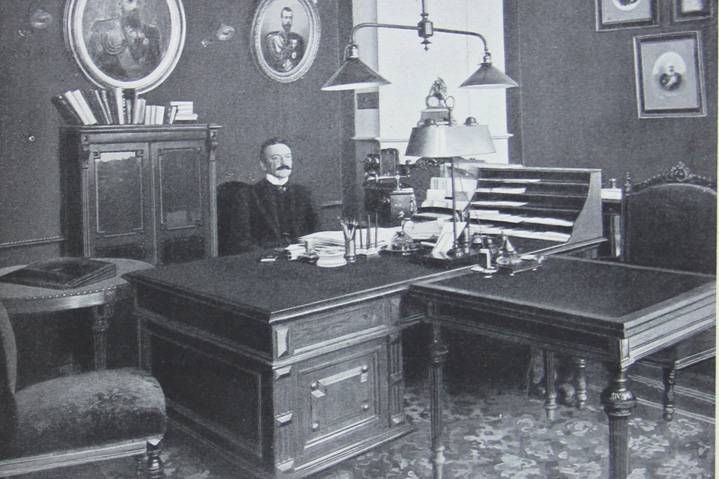
A. A. Lopukhin in the office
In the summer of 1908, 18-year-old Varvara and 12-year-old Maria Lopukhin, accompanied by a governess named Russell, were vacationing in Europe. On September 24 (new style) in London they went to the Aldwich Theater for the musical performance “The Merry Gordons.” At the end of the performance, taking advantage of the crowd, two men at the doors of the theater “pulled” Varvara away from her sister and governess and took her away in an unknown direction. Miss Russell contacted the police, about 100 people took part in the search for the girl, an advertisement was placed in newspapers describing the appearance of the missing person:
It is interesting that both revolutionaries and Black Hundreds were suspected of kidnapping the girl.
Two days later, Russell received a letter that said:
Everything ended well: Varvara Lopukhina was released without explanation after 6 days - she was put in a carriage and pushed out near St. Paul's Cathedral.
Meanwhile, Varvara’s father, A. Lopukhin, was summoned to London. Burtsev was already waiting for him on the way. On German territory between Cologne and Berlin, he entered his compartment and demanded confirmation of Azef’s betrayal. Burtsev himself later assured that Lopukhin did this voluntarily - since he was convinced of this agent’s double game.
However, one gets the impression that in fact this “noble hunter of provocateurs” acted as a banal blackmailer. Lopukhin's malfeasance was too serious: upon his return to St. Petersburg, he was deprived of his civil rights and sentenced to hard labor, which, however, was replaced by exile in Krasnoyarsk.
Lopukhin, of course, understood what awaited him - and still decided on a scandalous confession. The official version about some incredible eloquence of Burtsev, thanks to which he managed to talk to a high-ranking police official, does not stand up to criticism. Moreover, in London, for some reason, Lopukhin also went to a meeting with prominent Socialist Revolutionaries - Savinkov, Chernov, Argunov, and personally informed them that Azef was an agent of the Okhrana and a provocateur.
Azef's exposure had the effect of a bomb exploding; a terrible blow was dealt to the reputation of the Socialist Revolutionary Party. Mortally ill Grigory Gershuni wanted to leave the clinic in Geneva and go to Russia so that, by becoming a suicide bomber, he could wash away the shame with his blood from the Combat Organization he created - but he was unable to do this due to health reasons. Azef’s deputy, Boris Savinkov, stated the need to restore the “honor of terror.”
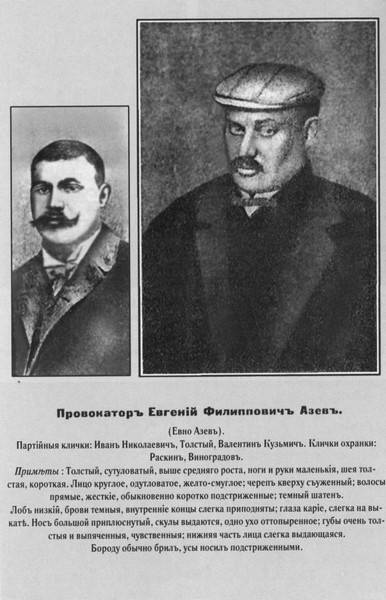
Leaflet notification of the Socialist Revolutionary Party about Azef’s cooperation with the secret police
On January 5, 1909, Azef was sentenced to death by members of the Central Committee of the Socialist Revolutionary Party, but never admitted his guilt. He managed to travel abroad, from where he wrote to the leaders of the Socialist Revolutionary Party:
However, later Stolypin, at a speech in the Duma, officially announced Azef’s work for the Security Department.
Savinkov had the opportunity to kill Azef, but he let him go. He spoke about this to other leaders of the Socialist Revolutionaries:
Then I asked myself the question: why, in fact, didn’t I shoot Azef right there during the interrogation? And so I must answer you completely sincerely, as I answered this question for myself.
I must tell you that my relationship with Azef in recent years has been very good. Personal friendship never existed between us, but in my eyes he was the only comrade worthy of me in past military affairs.
And I will not be mistaken when I say that my feeling for him was approximately brotherly.
When I became convinced that he was a provocateur, I realized that at that moment my feeling for him had not changed, that is, I did not perceive it with my feelings.
When I voted in the meeting for his murder, I voted purely logically, but personally, I undoubtedly did not feel the strength to kill him at that moment and during interrogation I spoke to him, knowing and understanding that he was a provocateur, not as if if I were talking to a stranger to me provocateur... the responsibility for the escape falls solely on me, that he ran away only because at the right moment I did not find the strength to kill him, to raise my hand against him... I consider the responsibility for his escape to be assigned personally on me and that it is I, more than anyone else, who is responsible for this.”
The Socialist Revolutionaries failed to “restore the honor of terror”: all planned terrorist acts failed.
The provocateur Azef, at the head of the Combat Organization, acted much more effectively than the honest socialist-revolutionary Savinkov. At the beginning of 1911, the Combat Organization of the Socialist Revolutionary Party was dissolved.
Azef in exile
Having gone abroad, Azef settled in Berlin, where he lived under the name Alexander Neumayr, avoiding meetings with people from the Russian Empire. Here he married again - his new chosen one was the young singer Hedwig Klöpfer.
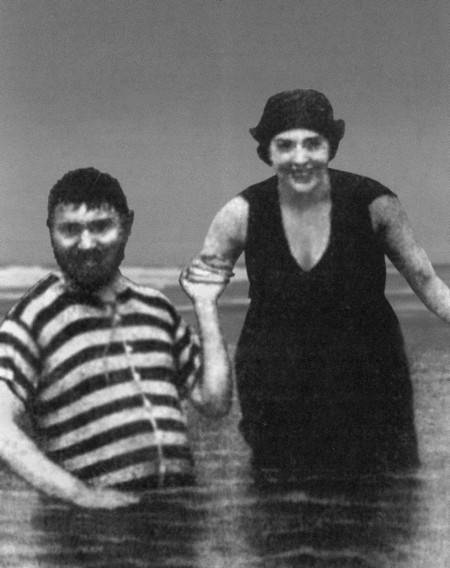
E. Azef and H. Klöpfer on the beach in Ostend
An excellent organizer, a man of iron will, a strategist, an unknown and omnipresent executioner, who kept the highest dignitaries of the Russian Empire at bay, in emigration suddenly turned into an unremarkable everyman.
Azef’s material well-being was undermined by the First World War, since he patriotically invested all his savings in Russian securities. I had to open a hat and corset workshop. And in 1915, as a suspicious subject of the Russian Empire, he was arrested and spent two and a half years in the famous Moabit prison.
The long-retired leader of the Socialist Revolutionary Fighting Organization was recognized by the German authorities as... an anarchist. He was released in December 1917, after the Bolsheviks concluded an armistice with Germany.
He did not live long after this - he died on April 24, 1918 from kidney failure. He was buried in unmarked grave No. 446 at Berlin Wilmersdorf Cemetery.
Information